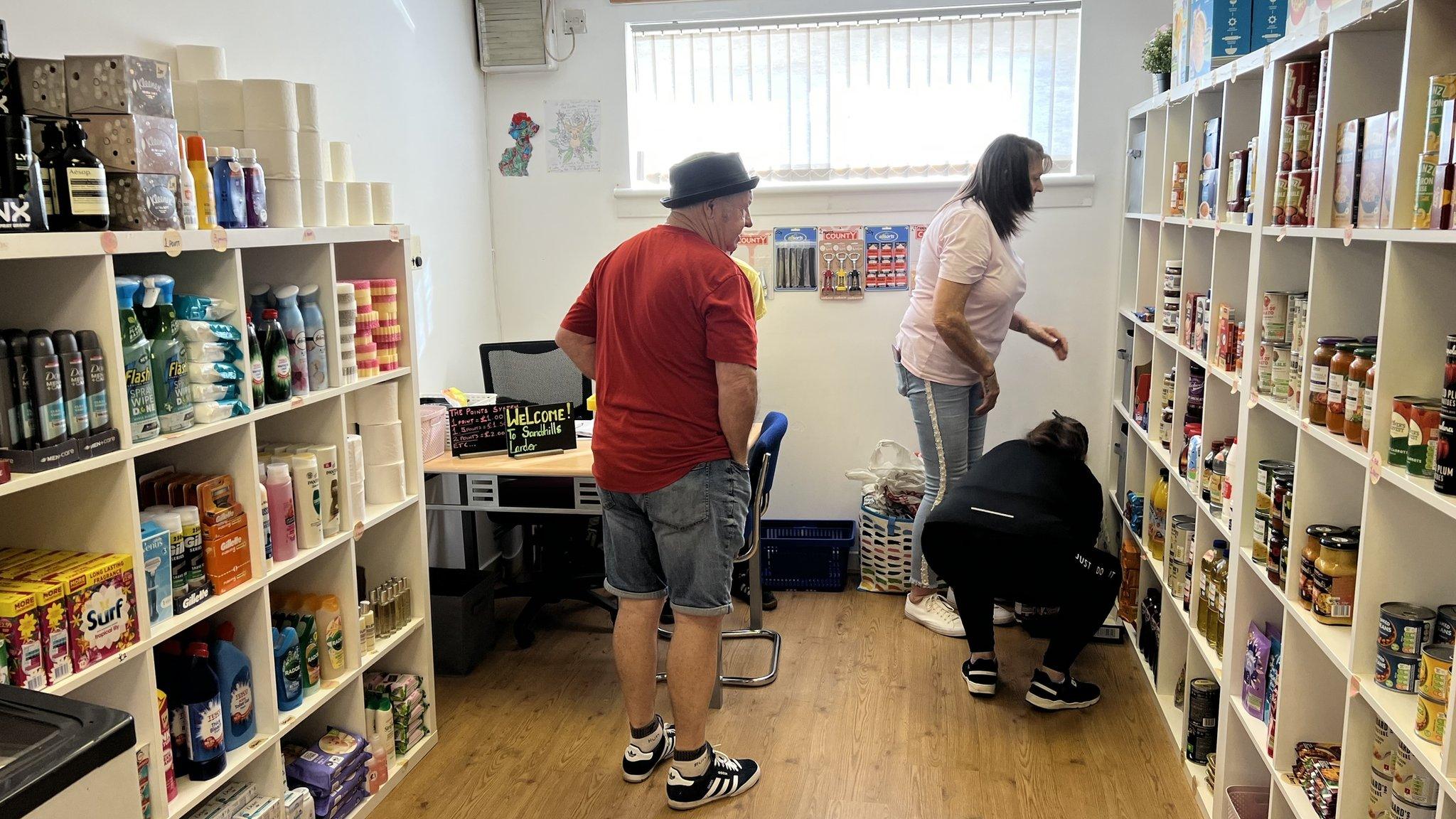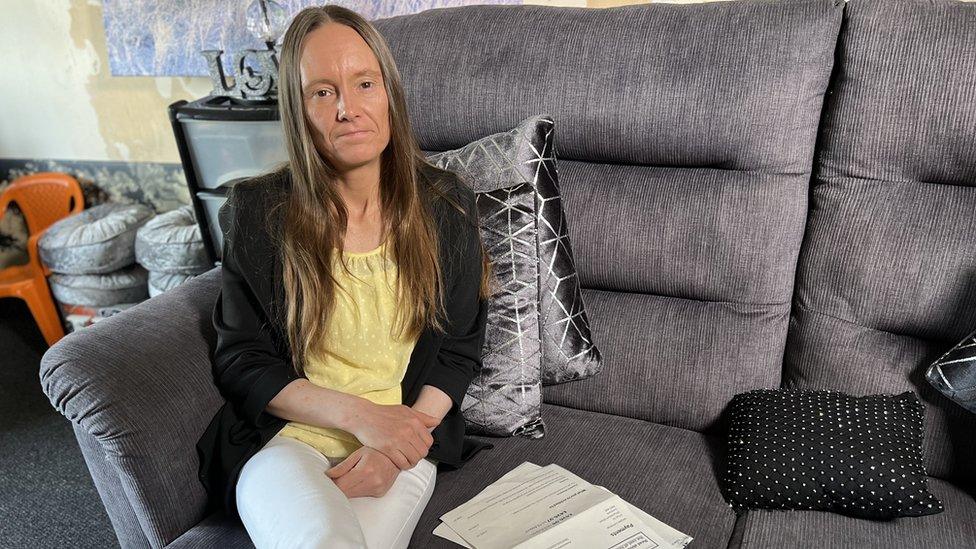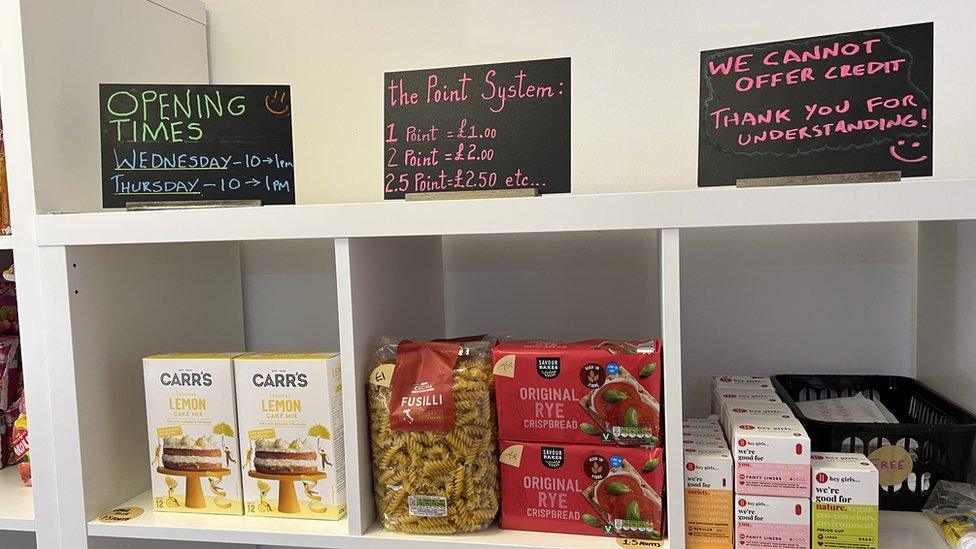Families on reduced benefits face tough winter, charities warn
- Published

The Sandy Hills food pantry offers basic items at reduced prices
Vulnerable families could increasingly be forced into destitution this winter because of the impact of universal credit deductions, anti-poverty campaigners have warned.
People get reduced benefit payments when they owe the government money. This can be through no fault of their own such as mistaken overpayments, or debt owed to other creditors such as landlords.
More than 800,000 households on universal credit received less money last year because they were previously awarded too much in tax credits, the BBC has found. More people will go on to the scheme from September.
To repay the debt, monthly benefits can be reduced by up to 25% by the Department for Work and Pensions (DWP).
The government said it was right to recover debts owed to the UK taxpayer.
But some MPs have dubbed universal credit deductions a "poverty tax" because of the impact the reduced income has on vulnerable families' ability to afford basic essentials.
Food inflation remains 30% higher than two years ago, and energy prices remain around double what they were in 2021 despite a recent dip.
Research shows this has a disproportionate impact on poorer households, with lower income families on average spend twice as much as wealthier households on food and energy.
Debt charities have also warned of a "debt timebomb" this year as more people seek help who do not have enough to cover basic essentials; personal debt levels have risen by an average of £791 per UK adult between 2022 and 2023, according to statistics compiled by the Money Charity.
This is aggravated, campaigners say, by less direct government support for struggling families than in previous years, with some politicians calling for the return of the £400 energy rebate this autumn to help shield families from the impact of potential further price rises.

'Before I get paid I'm already in debt'

Kellylee lives in Greenock and claims money from universal credit on a fortnightly basis. She's been out of work on a long term basis for mental health reasons and has three children.
Recent data shows an average of around £60 is deducted from claimants across the UK. She gets over £150 deducted for reasons including advanced payments and a spare bedroom.
It leaves her with around £400 every fortnight - which quickly goes on bills and essentials, leaving her with no choice but to rely on food parcels.
"After paying food and bills I'm not left with much else…before I get paid I'm already in debt. The money I owe is for loans for universal credit.
"If I didn't have the deductions I would be able to just make ends meet. I wouldn't have to borrow from family and friends. It's your pride at the end of the day.
"I've read inflation is supposed to be coming down but the price of one thing goes down and something else goes up so it doesn't make a difference trying to budget.
"Even if the deductions were smaller, which I can request but then I would just be paying for a longer period of time. So I would just be in more or less the situation.
"The government could put a hold on the deductions for people just so people have time to recover a little bit from the cost of living.
"If they didn't deduct so much money that would mean people would make ends meet."

Recent data shows that the total monthly amount deducted from Scottish universal credit recipients increased by £600,000 between December 2022 and February 2023, from the previous three month period and the number of households impacted grew by 12,000.
In England, the number of families facing deductions increased by 122,200 in the same period, and the amount deducted from families increased by £6,623,000; while and in Wales, the amount deducted increased by £394,000 and increased by 7,400 families.
SNP MP Chris Stephens, who obtained the figures, said deductions are pushing people into "deep financial hardship", saying the policy should be scrapped.
"There should be an amnesty on deductions resulting from the DWP's own errors, a replacement of upfront loans with grants, and a much lower cap on the monthly rate of deductions," he said.
Chris Birt, from poverty campaigners the Joseph Rowntree Foundation said families impacted by deductions will be looking at winter wondering whether things are going to get worse.
He said he was particularly concerned about people requesting budget advances during the five week wait period when claimants first apply for universal credit that is then deducted from payments.
"Many of these deductions…are because of the design of the universal credit system. They're nothing to do with how people manage money. People on low incomes manage daily miracles just to provide the basics for their family."

Pauline Gilgallon, development manager at Good Food Scotland, oversees a number of affordable food spaces in the Glasgow area, offering basic items at a significantly reduced price, including one in Sandy Hills.
The constituency where Sandy Hills is based, Glasgow East, has the highest claimants of universal credit in Scotland, according to the most recent figures, and the highest number of people facing deductions to their benefits.
"Even your basics, your bread, your milk, your dairy your eggs, it's become so so expensive. So we fill in a gap for people who maybe can't afford the normal supermarkets."
She says she's "deeply concerned" about the impact of universal credit deductions in the months ahead.
"Deductions are biting hard we're seeing it across all our projects."
She says she's heard stories of people being left "penniless" and is urging the government to ease off deductions.
"People assume it's food, it's fuel, but it's cutting so much deeper than that…I think the government don't have a clue."
A government spokesperson said that while it was right it balanced a duty to recover debts owed to the UK taxpayer, affordable repayment plans can be offered to claimants, as well as referrals to independent and free debt advice.
They also said recent increases in the National Living Wage and Minimum age will leave millions of workers better off.
A DWP spokesperson added: "Universal Credit deductions help protect claimants from enforcement actions such as eviction, ensure priority debts such as child maintenance are paid, and recover taxpayers' money when overpayments are made.
"But we recognise the pressures of the rising cost of living which is why the UK government is bearing down on inflation and providing record financial support worth an average £3,300 per household."
Labour have been contacted for a comment.
Related topics
- Published14 June 2023

- Published21 June 2023
